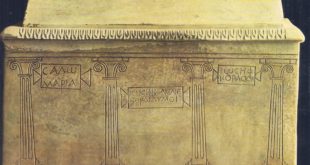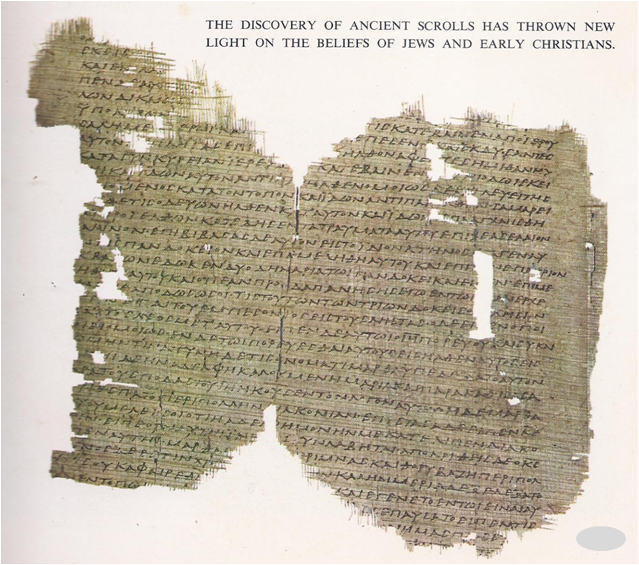Zealots, for sixty years or more, had formed the “resistance’’ against the Romans in Judaea and their ideas were shared by many other Jews who were not active members of their party. After the death of King Agrippa in A.D. 44, Judaea returned to direct Roman rule and from that moment Jewish history seemed to take on an air of inevitability. According to orthodox Jewish belief the Holy Land belonged to God and God alone. The presence of a Roman Governor in Jerusalem was in itself an affront to God and to pay tribute to the Emperor was to give to a non-believer what was God’s by right. Tension and disorder steadily increased, stimulated by Roman maladministration, Messianic excitement and nationalist activity. The fatal explosion finally came in A.D. 66. With the resulting loss of their land and the Temple at Jerusalem, the Jews’ religion ceased to be a religion that demanded the ritual of sacrifice and the people themselves were scattered abroad without a national home until the present century. In the summer of the year 66 the priests of the great Temple of Yahweh in Jerusalem refused to offer their customary daily sacrifices for the well-being of the Roman Emperor and people. These sacrifices were an accepted token of Israel’s loyalty to Rome and a refusal to continue making them was tantamount to a declaration of revolt. The priests concerned were members of the lower order of the Temple clergy, who subscribed to Zealotism. General view of Jerusalem Behind this refusal of the lower priests lay a complex situation. The higher clergy, who formed a priestly aristocracy, were presided over by the High Priest. This aristocracy supported the Roman government of Judaea because it ensured their own social and economic position; the maintenance of the “loyal” sacrifices was …
Read More »Paul of Tarsus A. D. 35 – 64
THERE was one man who had more to do with the future of the Christian church than even the apostles themselves, and his name was Paul, or Saul in Hebrew. He was the greatest of all Christian missionaries. Much more is known about Paul than about other leaders of the early church, for he wrote or dictated long letters of instruction and encouragement to various missions he had established. These letters were called epistles. A number of them were preserved and published. In addition, most of the Acts of the Apostles, the fifth book of the New Testament, deals with Paul and his teachings. Taken together, his epistles and the chapters of the Acts devoted to him make up almost one half of the New Testament. One of the most amazing things about Paul was that he first came to the attention of the brethren in Jerusalem as a dangerous enemy of the church. He was first mentioned in the Acts as one of those present during the stoning of Stephen: “And the witnesses laid down their garments at the feet of a young man named Saul.” He was one of the angry mob crying for the blood of Stephen, and he guarded the cloaks of the executioners while they were casting their stones. Paul was the kind of man who had to live by his faith. He was a Pharisee, well-educated in the Law, proud of his rich Jewish heritage and deeply loved the God of Israel. Anyone who mocked or offended God was guilty of blasphemy and deserved to be punished. There was no doubt in Paul’s mind that Stephen was guilty. Paul hated him for it and eagerly joined with those whom he believed to be carrying out the Lord’s punishment. According to tradition, Paul was short, …
Read More »The Life of Jesus Christ (B. C. 6 to 29 A. D.)
ALL THAT is known about Jesus of Nazareth appears in the first four books of the New Testament. These books, written many years after his death, are called the gospels of Matthew, Mark, Luke and John. There are differences of detail in each and the events of his life are not always reported in only one or two of the books, others in all of them. The gospels of Matthew and Luke, for example, begin with the birth of Jesus to a virgin named Mary. The gospels of Mark and John begin with events that took place some thirty years later. In general, the life story of Jesus is the same in all four gospels. Jesus was born in Bethlehem of Judea in the days of King Herod, probably about 6 B.C. Almost nothing is said of his childhood, except that he lived in a village called Nazareth in the province of Galilee with his mother Mary and her husband Joseph. Joseph was a carpenter. As a boy, Jesus probably served as his helper and became skilled in making such things as yokes for oxen, bins, chests, beds and kneading troughs. In his home, Jesus spoke the common language of the Jews, which was Aramaic. The synagogue served both as his school and as his place of worship. There he studied the Scriptures and probably learned his prayers in the ancient Hebrew tongue. We are told that during his youth he “increased in wisdom and in stature, and in favour with God and man.” Jesus was thirty years old when John the Baptist began preaching in the valley of the Jordan near the Dead Sea. John was believed to be a prophet. From Galilee and from all the other provinces of Palestine, people came in large numbers to hear him. …
Read More »The First Palm Sunday A.D. 29
IT WAS the Sunday before Passover. The soft greens of spring and patches of wild flowers brightened the hills above Jerusalem. The holy days of the Passover, celebrating the escape of the Jews from slavery in Egypt, would not begin until the following Friday at sundown. But people were already busy preparing for it. The roads leading into the Holy City were crowded with Jews coming to attend the rites in the Temple. On the roads were also herds of cattle, flocks of sheep and carts loaded with cages of turtledoves. These were being brought to the Temple to be sold for sacrifice on the altar of God. Each Jew, according to his ability, would make a burnt offering in thankfulness and praise to the Lord for delivering his ancestors from the hands of the Egyptians. In Jerusalem, bakers were busy baking flat cakes of hard bread, which was known as unleavened bread because it was made without yeast. Unleavened bread was the only kind the Jews were allowed to eat during the Passover. It was a reminder that their ancestors had eaten unleavened bread during their flight from Egypt, for then there had been no time to let the dough rise before baking. The Jews were not the only ones busy with preparations. In the great marble fortress of Antonia, Pontius Pilate, the Roman governor of Judea was regrouping his soldiers for special duty throughout the city. With hundreds of thousands of Jews expected for the Passover, a large force of guards had to be held in readiness to deal with any emergency. Ruling over the Jews was no easy matter. They were stubborn‚ willful, independent; not at all like other conquered peoples. Palestine had been an occupied country for almost five centuries. The Jews had been conquered, in …
Read More »



